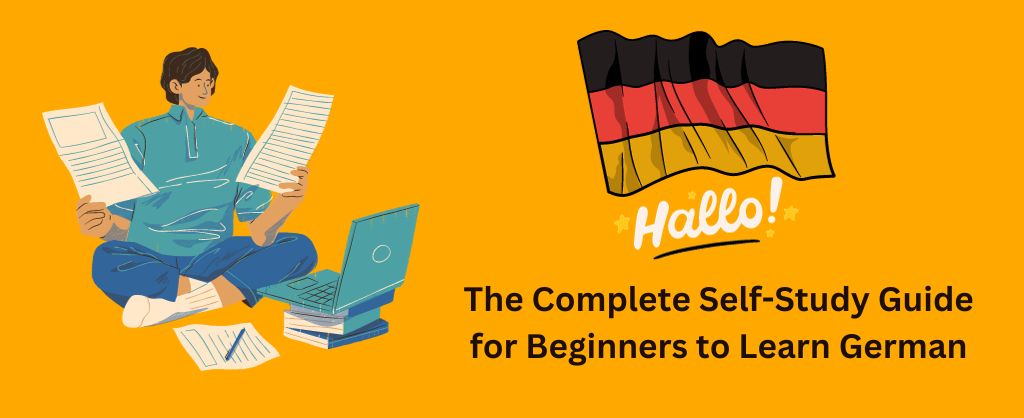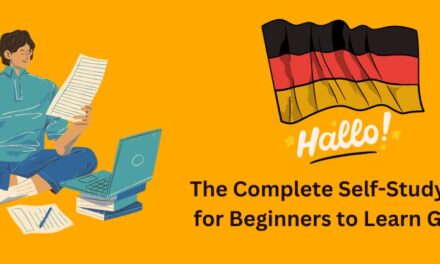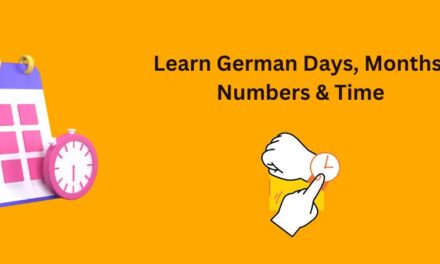The Ultimate Strategies for Teaching Yourself German in 2024

Learning a new language can feel intimidating, especially without the structure and guidance a formal classroom provides. However, self-directed study opens unlimited flexibility to immerse yourself in a new language on your own schedule.
With the right set of resources and a self-motivated approach, achieving fluency through independent immersion is entirely possible.
How to Learn German at Home: A Step-by-Step Guide for Self-Study
This comprehensive guide covers proven techniques, tools, and tips for effectively teaching yourself German in 2023. Follow these best practices for establishing a solid German foundation at your own pace:
Set Crystal-Clear Goals for Staying Motivated While Self-Studying German
As with any major endeavor undertaken independently, clearly defining your reasons for learning German and targets you want to hit are key for staying motivated in self-directed study.
Consider asking yourself:
- What initially drew you to the language? Interest in the culture, family background, professional usage, etc?
- What ability level are you aiming for? Basic conversational fluency? Business proficiency? Near-native mastery?
- Will you immerse through travel soon? Or is this for personal enrichment?
- What elements most interest you? Reading, writing, speaking, listening?
With a purpose-driven “why” etched firmly in mind, outlining measurable, realistic goals keeps your eyes always on the end prize.
As you self-direct learning, considering what daily, weekly, and monthly benchmarks indicate you are on-track towards German fluency helps quantify progress when not in a formal classroom setting receiving grades.
Maybe in month one you will master numbers, colors, basic greetings and phrases through beginner textbook vocabulary lists. By month three, holding simple dialogues about daily routines or ordering food becomes realistic.
Charting clear incremental goals maintains student accountability. But remain flexible – learning a language is a journey requiring patience with yourself above all.
Choose Structured Self-Study Resources to Learn German
Once determining your motivations and measurable targets, the logical next question becomes: where do I even begin learning an entirely new language independently?
With thousands of apps, books, podcasts, YouTube channels, online programs, and other resources touting claims as “the best” for language learning, the sheer options can feel overwhelmingly paralyzing.
Rest assured quality self-study content is available at all levels – the key is choosing efficient materials providing an intuitive structure for digesting new linguistic concepts methodically.
Efficient foundational German self-study resources exhibit qualities like:
- Lessons strategically designed to scaffold skills, with vocabulary and grammar progressive in difficulty
- Thorough explanations of fundamental concepts before accelerating into conversations
- Empowering learners to direct pace suitable for their retention
- Accounting for diverse learning styles through visual, auditory and kinetic modalities
- Making material relatable through practical dialogues and cultural anecdotes
- Enabling contextualization of German in real world application
For beginners, resources allowing you to literally start with the ABCs while gaining exposure to basic pronunciation, words and phrases are ideal. Controlling the speed of vocabulary introduction prevents memorization overload.
So seek resources with flexibility enabling you determine comfortable lesson pacing.
Supplementing textbook foundations with varied media types enhances engagement too. Podcasts, videos, games, flashcards and more means learners can rotate activities preventing burnout on any singular method.
Recommended Beginner Self-Directed German Learning Resources
Among boundless options, the curated selection below delivers an optimal blueprint for German fluency gains through independent immersion:
- Teach Yourself Complete German Textbook and Audio: Among finest entry-level self-study German guides, this Teach Yourself language learning manual provides comprehensive fundamentals. Through highly-structured lessons and audio narration by German voice artists, you systematically progress from greetings and pronunciation into conversations about work, leisure, dining and more.
- The Everything Learning German Book: For supplementary reading further reinforcing vocabulary fundamentals like numbers, colors and common household item words in contextual German sentences. Practice deciphering new words based on sentence clues.
- Duolingo: Gamified exercises make Duolingo among the most addicting language apps. Bite-sized repetition strengthens vocabulary recognition and listening comprehension with short lessons spanning reading, writing and speaking. Their tips section also explains grammar clearly.
- Memrise: Another essential app for beginners through advanced learners crafting adaptive flashcards around core vocabulary lists, idioms and grammar points taught through textbooks. Helps solidify word memorization through spaced repetition technology for long-term retention.
- Youtube Channels and Podcasts: Hearing vocabulary, phrases and grammar employed conversationally cements proper application. Deutsche Welle’s Langsam Gesprochene Nachrichten series provides slowed German news recordings with transcripts helping comprehension. Podcasts also deliver listening immersion.
Accelerate Proficiency Through Intermediate German Self-Study Techniques Once establishing elementary proficiency, do not merely continue beginner textbook sequences or else risk plateauing.
Mastery demands exposing yourself to academic, business or specialized German aligning closer with your end goals.
Intermediate learners must focus on:
- Growing vocab range beyond basic travel words
- Understanding complex grammar enabling nuanced self-expression
- Following native speaker conversations and media sans scripts
- Strengthening written communication for emails, documentation etc.
Recommended Intermediate+ Self-Study Resources Include:
- Living Language German Progaram: For structured advancement into discussing work, current events, politics, arts and abstract ideas through reading, writing and listening activities plus grammar reinforcing important intermediate expressions.
- FluentU: Curates German videos including commercials, talks, news clips and cinema excerpts transformed into personalized immersive lessons. Interactive subtitles, dictionaries and flashcards aide comprehension too. Adapts recommendations to ability level.
- LingQ: Importing German content you actually enjoy (podcasts, books, blogs, playlists) makes learning feel less forced. LingQ tracks known versus unknown vocabulary as you read/listen so lookups are fast. Lesson paths also available but importing your interests delivers motivation.
- iTalki: Once confidence speaking German conversationally builds, practice through exchange partners via paid tutoring conversations on iTalki (or conversations exchange communities to find unpaid partners). Immerse through unscripted dialogue!
Self-Study German Through Immersion not Isolation
Abandoning solitary studying proves essential reaching advanced milestones. Do not simply complete worksheets, apps and textbooks in perpetuity without applying German into authentic usage.
At a certain stage, active immersion accelerates the final strides towards fluency. Ways to immerse in the culture include:
- Read German books, newspapers and magazines catering to your intrigue area
- Attend local Goethe Institute German language MeetUp groups
- Watch shows and films from Germany, Austria and Switzerland on Netflix/Youtube
- Follow German language accounts posting about topics of interest on social media
- Listen to German radio stations and podcasts consistently
- Travel to German-speaking countries whenever possible for cultural + linguistic immersion
The single most important element though is speaking! At every opportunity, put into practice the language foundations instilled through self-directed lessons. Language skills strengthen mainly through usage.
Final Thoughts on Self-Studying German Efficiently
Learning German independently absent an instructor guiding pace and accountability seems daunting. But embrace exercising complete control over the when, where and how studying occurs as liberty enabling you carve out routines sustainable long-term.
Just be sure not developing gaps in knowledge foundations – use structured resources preventing uneven weaknesses. Continually increase challenge level too – stagnating too long on elementary content breeds plateauing.
Most importantly, participate consistently in some form of active German immersion matching interests. Prioritize daily speaking, reading, writing and listening surrounding themes personally captivating.
This transforms progress accelerating when self-study stops feeling like studying. You got this!












